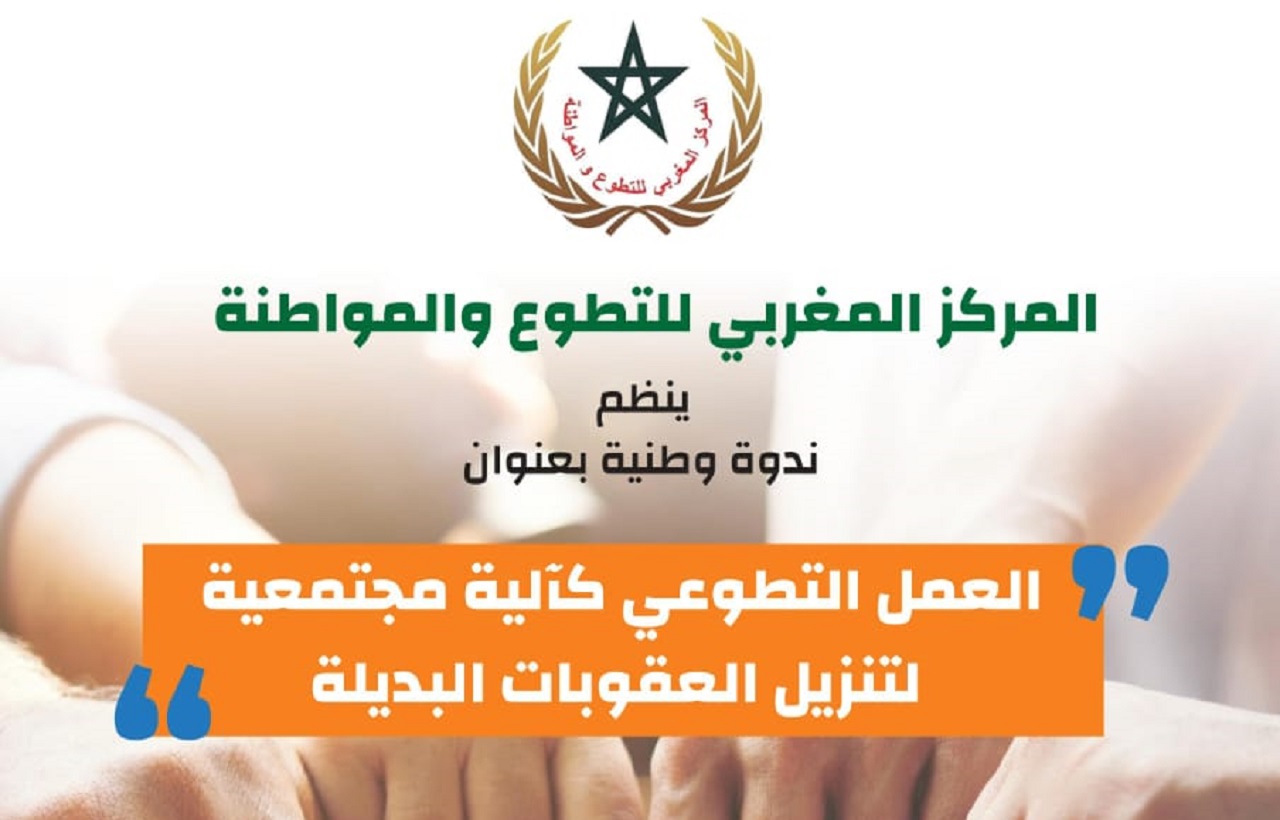Electronic flag – Rabat
The Moroccan Center for Volunteerism and Citizenship announced its readiness to participate in the community workshops called for by His Majesty the King, Mohammed VI, may God grant him victory, in the speech of the King and the People’s Revolution in August 2009, which the government translated into draft Law No. 43.22 related to alternative penalties approved on June 8, 2023, by During the organization of a national symposium on October 19, 2023, in order to open a legislative, human rights, societal and civil debate.
The center indicated in a communiqué that Al-Alam received a copy of, that the symposium will be organized with the participation of sectors, public institutions, the legislative institution, academics, and civil and human rights actors, to discuss and exchange views and a tribal study of what these alternative solutions adhere to in terms of tools and mechanisms for achievement and tracking, the extent of their effectiveness on the ground, and the challenges it raises. Incorporating voluntary work as a community mechanism for implementing alternative punishments.
The same source explained that the concept of punishment in modern man-made laws has witnessed a great development, as the role of punishment is no longer limited to the concept of punishment as a punishment aimed at taking revenge on the convict, but rather the punishment has become an essential role in balancing the interest of society and protecting the convict, adding that the trend Modern forensic science is dominated by the personal nature of punishment by presenting it as a means of treatment. That is why the International Organization for Penal Reform defines alternative punishment as “a set of measures taken by society to punish violators of its laws with the aim of reforming them and applying punishment to them without implementing them in places that make them isolated from society.”
The center opened a general invitation to participate in the horizon of finding alternatives and possible scenarios to integrate the voluntary dimension of work, behavior, education and correction in the application of alternative penalties, under the supervision of a scientific committee consisting of ladies and gentlemen: Dr. Abdel Aziz Qaraqi: Deputy Dean in charge of Scientific Research, Cooperation and Partnership at the Faculty of Legal, Economic and Social Sciences, Souissi – Rabat, Professor of Political Science and Constitutional Law – Dr. Hanan Bengasem: Professor of Higher Education at the Faculty of Legal, Economic and Social Sciences, Settat, Coordinator of the Master’s Degree in Civil Society and Participatory Democracy – Dr. Abdul Qadir Al-Kaihel: Professor of Higher Education at the Faculty of Legal, Economic and Social Sciences, Salé – Dr. Abdelhafid Adminou: Professor of Higher Education, Faculty of Legal, Economic and Social Sciences, Souissi, Mohammed V University, Rabat – Dr. Abdelmoula Mesaid: Professor of Higher Education at Sultan Moulay Slimane University in Beni Mellal, Head of the Masarat Center for Research and Legal Studies – Dr. Ruqaya Ashmal: Research Professor in Public Law at the Faculty of Education Sciences, Mohammed V University in Rabat – Dr. Abdul Wahed Al-Quraishi: Professor of Higher Education at Sidi Muhammad bin Abdullah University in Fez, Director of the Journal of Illuminations in Legal Studies – Dh. Siham Mutahhar: PhD researcher in Public Law and Political Sciences, Faculty of Legal, Economic and Social Sciences, Mohammedia, Vice President of the Moroccan Center for Volunteering and Citizenship, in charge of Communication – LLC. Khamis Fadili: Lawyer at the Casablanca Authority, researcher in business law, legal advisor to the Moroccan Center for Volunteering and Citizenship.
The Moroccan Center for Volunteerism and Citizenship concluded its communication by evoking a set of national experiences and models in integrating voluntary work and making it a community mechanism for the reduction of alternative penalties, similar to the Mohammed VI Foundation for the Reintegration of Prisoners, the reconciliation experience of the High Commissioner for Prisoners, the experience of the Equity and Reconciliation Commission, in addition to the new constitutional roles of organizations. Civil society and its experience from within the walls of prisons, considering that these societal mechanisms are important tools for the success of this community workshop.
The center also expressed its hope to come out of this symposium with practical recommendations, which could constitute a propositional force in linking voluntary work with alternative penalties, so that it would be a unique model experience in the Kingdom of Morocco under the wise leadership of His Majesty King Mohammed VI, may God grant him victory.
